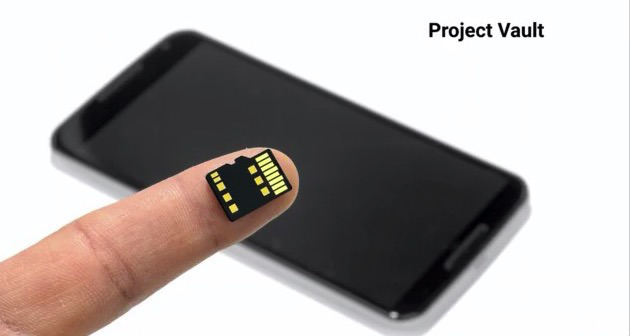Secure computer inside Micro SD card

Since millions of hackers, spammers and scammers hunt for your personalized online information, you cannot expect your passwords to remain secure despite their complexity. Most of us worry about losing our password, as we constantly register with more and more online services.
However, Google is also concerned about your online safety and wants to help you protect your most valuable information in the most sensible way. Google created what is the smallest computer - Project Vault.
')
This catchy name was introduced on the second day of the annual Google I / O Developer Conference.
Project Vault is a completely secure computer developed by Google ATAP (Advanced Technology and Projects), packed in a microSD card that can be inserted into any system, be it a PC or mobile phone.
Vault is technically a computer, but it is not a regular computer. Rather, it is a new way to communicate with friends and log in to the network, without introducing passwords.
Today we choose passwords that we think are tricky or easy to remember. Google wants to make your passwords even more personal than we might think.
A small chip can authorize you even before the program or site requests a password from you. In short, Vault will make your primary authorization (i.e. using a password) secondary. In this case, you do not need to do anything.
With Project Vault, Google will turn your devices into your ids. Vault can encrypt or protect your applications and chat messages, providing additional levels of verification, so your device can be sure that you are really you.
By demonstrating the trial version, the ATAP team showed how two people can safely communicate with each other using smartphones with a Vault installed in them. Once the chip is installed, the chat program opens a virtual system consisting of two files, with functions to read / write, input / output.
Vault encrypts chat messages by sending them as a code through a special secure channel. Vault never sends them through the phone so that no one can spy on you. After receiving the message, the phone automatically decrypts it, but, while none of the phones involved in the correspondence can not recognize the keys or algorithms.
The company says you can also encrypt videos with Vault.
Project Vault has:
- ARM based processor;
- Transmitter;
- A close communication system (NFC) for communicating with nearby devices;
- 4 gigabytes of "isolated, sealed" internal memory;
“Its ultra-secure operating system focuses on privacy and data protection.”
- A set of cryptographic services.
Vault uses a custom-made real-time operating system (RTOS) with a set of encryption services, including hashing, group coding, subscription, and hardware random number generator. All this is done to keep your information and your communication with friends safe.
Vault works with any operating system, including Android, Windows, Linux and OS X, because it is a storage device that is compatible with any computer and phone.
I call it smarter, because here all the work is done by the device itself, without human intervention in setting up the device. This makes it very convenient to use.
Project Vault is now in a “very experimental stage” and is in preparation for use, but the source code of its system is already available on GitHub so that developers can begin to study it.
Source: https://habr.com/ru/post/259331/
All Articles